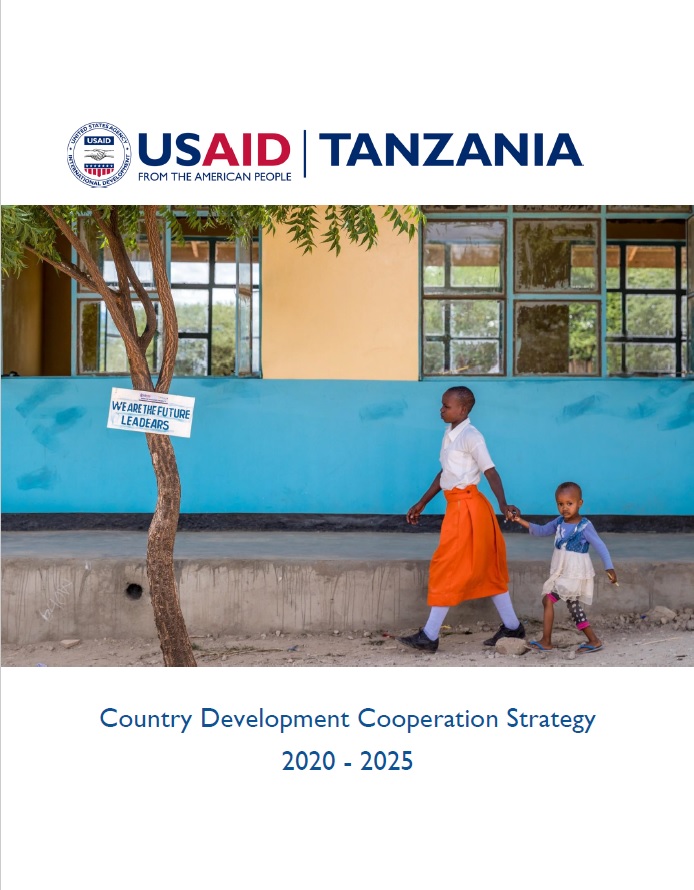Speeches Shim
USAID Tanzania Strategy 2020 - 2025
Tanzania’s growing, youthful population represents a tremendous opportunity as well as potential challenges. During this five-year strategy, the population of Tanzania will grow by over 10 million individuals, simultaneously putting pressure on social services for the youngest Tanzanians and facilitating great economic potential. Young Tanzanians are overwhelmingly energized, motivated, and committed, and together with the government, the private sector, and civil society, USAID will facilitate youth’s role in advancing the country’s long-term prosperity and Journey to Self-Reliance. USAID envisions a future where Tanzanian youth thrive because they have adequate education, health care, nutrition, voice, and economic opportunity. In order to achieve our goal, USAID will focus on three development objectives (DO), including:
- improve the foundational skills of children below age 15;
- increase the empowerment, productivity, and engagement of Tanzanians from 15 to 35; and
- strengthen the capacity of state and non-state actors to benefit future generations.
The USAID/Tanzania CDCS advances the United States’ strategic interests by improving the lives of Tanzanians and helping the nation progress beyond its need for development assistance. Through this strategy, USAID addresses global health security concerns, improves the business environment to create opportunities for U.S. firms, and combats wildlife trafficking and other forms of illicit trade. By enabling private sector growth, we will help young Tanzanians increase productivity and consumption, creating opportunities for U.S. businesses, and increasing two-way trade. In response to continued backsliding and closing civic space, we will foster the political will, commitment, and capacity required to strengthen democratic governance, promote accountability, and protect human rights.
The evidence points to a need to invest in children for long-term prosperity, and DO1 will make early investments in children that will have benefits that compound throughout their lives and make society as a whole more prosperous. To achieve this, USAID will partner with Tanzanians to improve basic education, health care, and nutrition, and provide the safe and supportive environments necessary for Tanzania’s youngest generation to develop into successful adolescents and adults.
USAID will also increase the productivity and engagement of Tanzanians aged 15-35. DO2 will build on and reinforce the strengths of young Tanzanians, providing them with the health and education services, pathways to economic opportunity, and civic and leadership skills they need to further self-reliance for themselves, their communities, and Tanzania. DO2 will build leadership capacity among 15-35-year-olds, creating opportunities for greater civic and societal engagement and providing avenues through which they can gain critical knowledge and skills. Supported youth will advance Tanzania’s long-term prosperity while shaping the country they desire for the future.
Lastly, USAID’s investments will strengthen the capacity of state and non-state actors to benefit future generations, solidifying the gains achieved in the other two DOs. DO3 will work with local governments to improve enabling environments, citizen-responsive governance, and institutional capacity to provide and manage critical social services such as healthcare and education. This work includes helping the country manage its biodiversity and water resources in collaboration with the government, private sector, and community institutions. Together with Tanzanian institutions, USAID will seek solutions to barriers that inhibit business growth, and complement job creation efforts under DO2. We will also strengthen the capacity of civil society actors to become more organizationally capable, financially viable, and credible partners.
Across the portfolio, USAID will partner with a cross-section of Tanzanians to strengthen institutions and policies. The private sector, and the market-based development solutions they develop and champion, are core to the achievement of this CDCS. We will jointly find innovative and sustainable solutions to Tanzania’s development challenges. Similarly, USAID will link with local governments to strengthen their public financial management and build upon their commitment to their constituents.
High rates of economic growth have enabled Tanzania to achieve an important benchmark: reaching lower-middle-income status in July 2020. This CDCS supports the government’s priorities outlined in its Development Vision 2025 by focusing on developing human capital, as well as institutions and systems which the Government of Tanzania sees as critical to achieving and sustaining its long-term vision. USAID will seek opportunities to bolster demonstrated commitment to policies that further the achievement of this strategy.
We will continue work that protects the most vulnerable youth, with a specific emphasis on girls and young women, by recognizing their differentiated experiences in terms of opportunities and challenges to reach their full potential. To achieve this, social services must be youth and gender-friendly, particularly health services. In recognition of the importance of quality education for all, we will support improved outcomes by working with teachers and school administrators, improving teaching methods, and increasing school attendance and retention rates with a particular emphasis on girls. Programming will address inequalities in employment and income, ensuring that women have equal access to productive resources, information, and technologies. A particular effort will be made to ensure that young women’s voices are elevated, that they are given ample opportunities for civic engagement on their priority issues, and that organizations we partner with represent a diversity of views and voices.



Comment
Make a general inquiry or suggest an improvement.